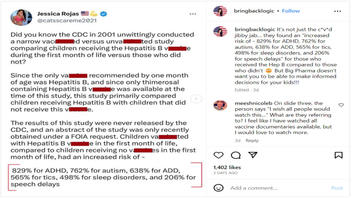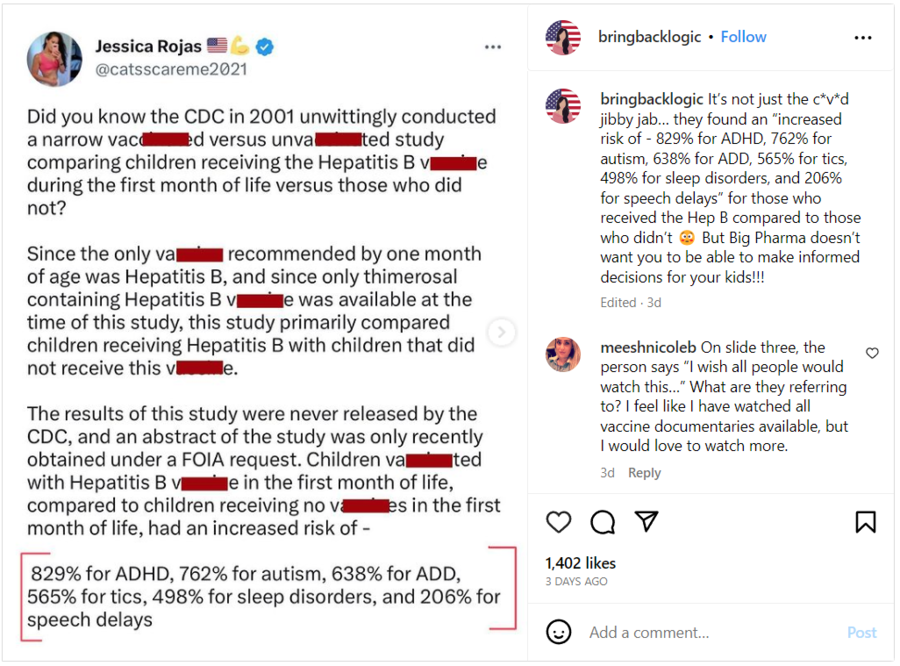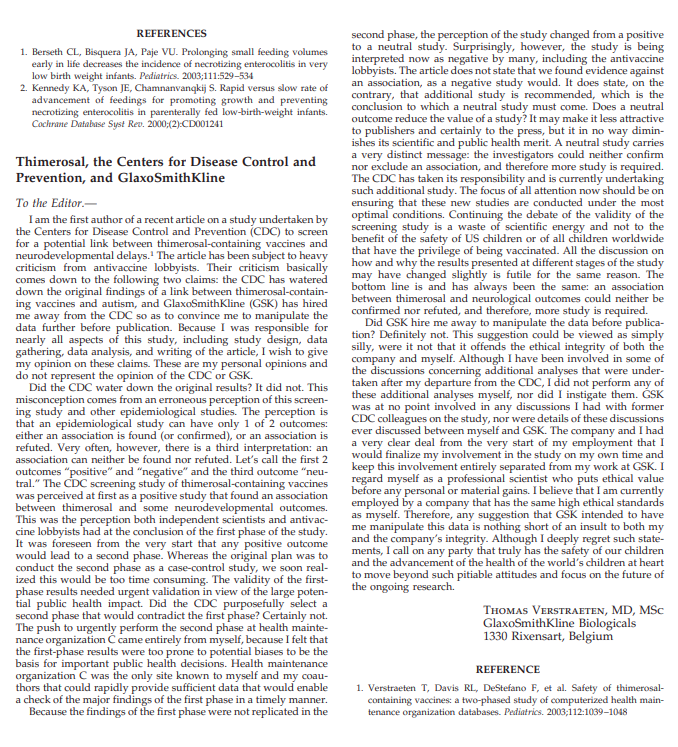STORY UPDATED: check for updates below.

Did the Centers for Disease Control and Prevention (CDC) suppress the results of a study that purportedly showed an increased risk of neurodevelopmental delays in newborns who were given a Hepatitis B vaccine during the first month of life? No, that's not true: The results of the study have been available for decades. The early findings of the two-phase study were first presented to medical professionals in June 2000. The completed study was published in the journal Pediatrics on November 1, 2003.
The claims appeared in a post on Instagram on April 6, 2023. The description for the post says:
It's not just the c*v*d jibby jab... they found an "increased risk of - 829% for ADHD, 762% for autism, 638% for ADD, 565% for tics, 498% for sleep disorders, and 206% for speech delays" for those who received the Hep B compared to those who didn't 😳 But Big Pharma doesn't want you to be able to make informed decisions for your kids!!!
The partially obscured text in the meme of the post says:
Did you know the CDC in 2001 unwittingly conducted a narrow vaccinated versus unvaccinated study comparing children receiving the Hepatitis B vaccine during the first month of life versus those who did not?
Since the only vaccine recommended by one month of age was Hepatitis B, and since only thimerosal containing Hepatitis B vaccine was available at the time of this study, this study primarily compared children receiving Hepatitis B with children that did not receive this vaccine.
The results of this study were never released by the CDC, and an abstract of the study was only recently obtained under a FOIA request. Children vaccinated with Hepatitis B vaccine in the first month of life, compared to children receiving no vaccines in the first month of life, had an increased risk of -
829% for ADHD, 762% for autism, 638% for ADD, 565% for tics, 498% for sleep disorders, and 206% for speech delays.
This is what the post looked like on Instagram at the time of writing:
(Source: Instagram screenshot taken on Mon Apr 10 15:58:18 2023 UTC)
The post doesn't provide any evidence to support its claims that the results of the study were "never released" and "only recently obtained under a FOIA (Freedom of Information Act) request." Neither is true. The information has been widely circulated for about two decades and was never suppressed or hidden.
The early results of the two-phase study were first presented at a "Scientific Review of Vaccine Safety Datalink Information" meeting that was held June 7-8, 2000, in Norcross, Georgia. Among the presenters at the session was lead study author, Dr. Thomas Verstraeten.
As part of his opening statement, Dr. Walter Orenstein. then-Director of the National Immunization Program at CDC, said, the meeting was "an effort to evaluate whether ... there were any health risks from mercury in any of these vaccines." Thimerosal, a mercury-containing organic compound, has been widely used as a preservative in a number of biological and drug products since the 1930s, according to the Food and Drug Administration.
Vaccine Safety Datalink
The CDC's Vaccine Safety Datalink started in 1990 and is used to monitor the safety of vaccines and conduct studies about rare and serious adverse events following immunization. A project overview on the VSD website says:
The VSD conducts vaccine safety studies based on questions or concerns raised from the medical literature and reports to the Vaccine Adverse Event Reporting System (VAERS). When there are new vaccines that have been recommended for use in the United States or if there are changes in how a vaccine is recommended, the VSD will monitor the safety of these vaccines.
The completed study, "Safety of Thimerosal-Containing Vaccines: A Two-Phased Study of Computerized Health Maintenance Organization Databases" was published in the journal Pediatrics on November 1, 2003, three years following the presentation of its early findings. The study concluded::
No consistent significant associations were found between TCVs [thimerosal-containing vaccines] and neurodevelopmental outcomes. Conflicting results were found at different HMOs for certain outcomes. For resolving the conflicting findings, studies with uniform neurodevelopmental assessments of children with a range of cumulative thimerosal exposures are needed.
The study immediately came under fire from antivaccine lobbyists. The criticism prompted a letter to the editor of Pediatrics by Verstraeten in 2004. His full response appears below:
(Source: Sci-Hub screenshot taken on Mon Apr 10 21:38:03 2023 UTC)
Regardless of the positions taken on the conclusions of the study, the claims made in the Instagram post are false. The study wasn't suppressed by the CDC and wasn't "recently obtained" as part of a Freedom of Information Act request. It has been widely available for 20 years.
Centers for Disease Control and Prevention
In an April 10, email to Lead Stories, Nick Spinelli, a public affairs specialist with the CDC, said the claims in the Instagram post are false. He continued:
Studies have repeatedly shown that there is no link between receiving vaccines and developing Autism Spectrum Disorder (ASD). The National Academy of Medicine, formerly known as Institute of Medicine, reviewed the safety of eight vaccines to children and adults. The review found that with rare exceptions, these vaccines are very safe. Additionally, a CDC study published in 2013 added to the research showing that vaccines do not cause ASD.
Since 2003, there have been nine CDC-funded or conducted studies that have found no link between thimerosal-containing vaccines and ASD. These studies also found no link between the measles, mumps, and rubella (MMR) vaccine and ASD in children. Specifically, the 2004 scientific review you referenced concluded that 'the evidence favors rejection of a causal relationship between thimerosal-containing vaccines and autism.'
Additional fact checks related to COVID-19 vaccines can be found here.
Updates:
-
2023-04-11T15:37:32Z 2023-04-11T15:37:32Z Adds response from the CDC



















